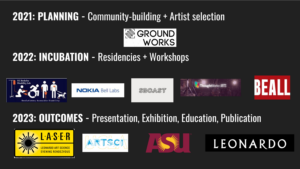CripTech Incubator is an art-and-technology fellowship centered on disability innovation. Building on Leonardo/ISAST’s full-cycle creative engine, encompassing residencies, rapid-prototyping workshops, presentations, publication and education, this innovation incubator creates a platform for artists with disabilities to engage and remake creative technologies through the lens of accessibility. Led by Lindsey D. Felt and Vanessa Chang.
Calling Up Justice is supporting planning, implementing and debriefing quarterly community meetings, developing a model for an accessible art and technology residency, co-developing and reviewing accessibility materials and artist selection processes. They are working as an access doula and leading teams of access doulas. This collaboration entails strategy, planning and debriefing meetings, document review, copy-writing, and group facilitation. Claudia Alick is the lead artist from CUJ on this project.
2024
Leonardo Volume 57, Issue 2 Criptech & the Art of Access Special Issue Launch Event
This event celebrates the launch of the Leonardo special issue, “Criptech and the art of access.”
Crip Technoscience, or CripTech for short, takes root in crip theory, a field of research invested in re-centering the skills and knowledge disabled people cultivate to remake inaccessible worlds. In recent years, scholars, activists, and arts practitioners have demonstrated the power of “aesthetic access” or “creative access” in museums, curated exhibitions, and arts spaces, reimagining what access can be when it transcends basic accommodation or regulatory compliance. From participatory audio description that offers multiple renditions of a single work, to poetic reinterpretations of captions and access doulas for remote gatherings, there has been an exciting paradigm shift that translates to new sensory possibilities for how visitors can engage with the arts. Despite their multimodal capacities, many media and science-based art and art-making tools such as VR, AR, digital games, and biotechnology remain inaccessible and have yet to benefit from this critical attention.
This collection draws together emerging scholarship in crip technoscience with artistic practices that expand the creative horizon of accessibility. It asks: What does it mean to crip art, science, and technology knowledge and praxis? How can we build in access as a creative or design principle in digital art and art-making tools? What new possibilities for creating, producing, experiencing media and science-based or tech-enabled art might emerge from disabled artists’ knowledge and practices? What new frameworks emerge for art, science, and technology when we center access institutionally?
Moderated by special issue editors Lindsey D. Felt and Vanessa Chang, this roundtable discussion gathers contributors Laura Forlano, Marina Tsaplina, Ysolde Stienon, Aminder Virdee, Erika Jean Lincoln and Darrin Martin to explore these questions. Access Doulaing from Claudia

